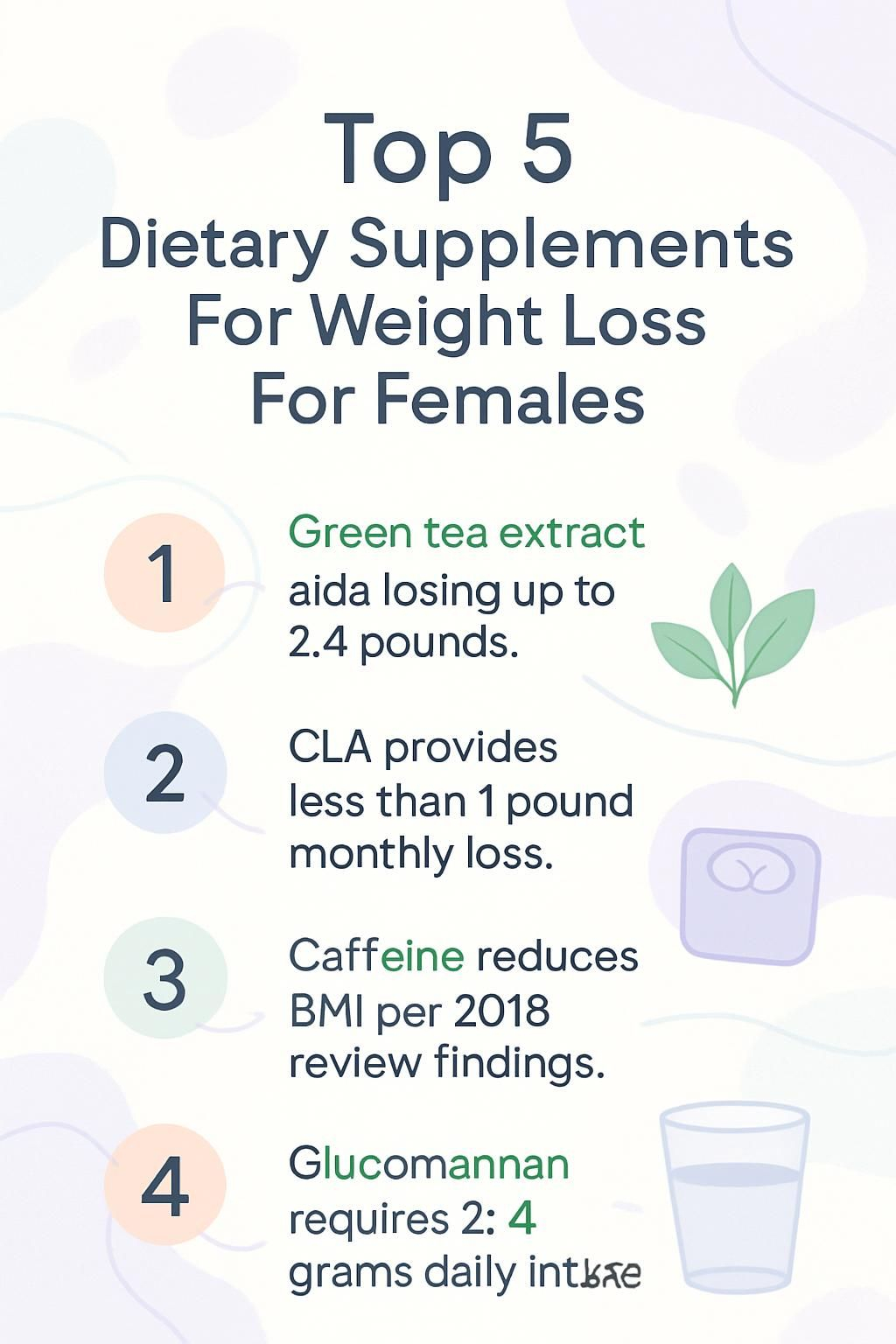Top 5 Dietary Supplements For Weight Loss For Females
Our Nutrition Assistant AI Suite will transform your body. You will lose fat, get toned, and build muscle. Gain confidence and optimal health.
You want safe, clear options that help you reach your goals without guesswork. Supplements for weight loss can support your plan, but results depend on the product and how you use it. This guide explains five common choices, how they work, risks to watch for, and tips to match them to your needs.
Use this as a quick map for your healthy diet and exercise routine. A smart weight loss supplement can add a helpful push, not replace your habits.
Key Takeaways
- Green tea extract may help females lose about 2.4 pounds over 12 weeks, likely from a faster metabolism and less appetite. Mild stomach side effects can occur, and rare cases of liver injury have been reported.
- Conjugated linoleic acid, or CLA, tends to produce small changes, often less than one pound per month. It is not FDA approved for weight loss, and long-term safety in women is uncertain.
- Caffeine-based products can raise calorie burn and lower BMI in some users, based on a 2018 review of 13 trials. Sensitive users may feel jittery, sleep poorly, or develop dependence.
- Glucomannan fiber helps you feel full and can lower BMI when taken at 2 to 4 grams per day with water. It may cause gas or bloating, and choking risk rises if you swallow pills without enough fluids.
- Protein supplements can protect lean muscle during calorie cuts, as seen in a 2018 trial in postmenopausal women. Quality differs across brands and types, so read labels.

What Are Dietary Supplements and How Do They Help With Weight Loss?

Dietary supplements for weight loss often include vitamins, minerals, fiber, and plant extracts. A weight loss supplement can support metabolism or help manage appetite as part of a full weight management plan.
What exactly are dietary supplements?
Supplements include vitamins, minerals, fiber, caffeine, and herbal ingredients. They come as pills, capsules, powders, or liquids sold in stores and online.
They are not prescription medication, and they do not prevent or cure disease. Companies must label them honestly and keep harmful substances out.
The Food and Drug Administration, or FDA, does not approve supplements before they are sold. The FDA can act after sale if a product is unsafe or makes false claims.
Many women choose supplements to curb appetite or to add support to their weight loss efforts. That choice makes sense if you start with clear goals and a healthy plan.
Supplements can add nutrients or support specific goals, but they cannot replace real, healthy foods.
How can dietary supplements support weight loss?
Supplements work in different ways. Some fat burners, such as green tea extract and caffeine, can raise energy use and heat production, a process called thermogenesis.
Protein powders can help lower fat mass while protecting muscle during a calorie deficit. Fiber supplements like glucomannan act like an appetite suppressant, help you feel full, and support steady blood sugar.
A 2017 review of 12 clinical trials reported that added fiber lowered BMI and body fat in adults with overweight or obesity. If you lack magnesium, fixing that gap may support metabolic health and energy levels.
Some pills try to block fat absorption or increase fat oxidation, which limits how much fat you store. You will see better results if you combine these products with regular exercise and a healthy diet, not as a stand-alone fix.
Key Factors to Consider When Choosing a Weight Loss Supplement
Your choice can affect body weight, energy, and even your heart rate. Reading labels, checking side effects, and knowing which ingredients work will help you stay safe.
What safety and regulations should I know about?
Dietary supplements do not need FDA approval before sale, including weight loss products. Companies can sell fat burners or bodybuilding supplements without proof of effectiveness up front.
The FDA steps in if there are safety problems or false claims. Ephedra, also called ma huang, was banned after reports of heart attacks and severe high blood pressure.
Some products have hidden ingredients, including prescription drugs. These can lead to liver damage or cardiovascular disease.
Labels that say natural are not a safety guarantee. Herbs can still raise blood pressure or interact with prescription drugs.
Use trusted sources like the NIH Office of Dietary Supplements and the National Center for Complementary and Integrative Health for background information.
Even natural ingredients can pose risks if they affect your heart rate or if they interact with your medicines.
Which ingredients are effective for weight loss?
Green tea extract contains caffeine and catechins, two compounds that support fat metabolism and calorie burn. Caffeine-based products have also lowered body weight and BMI in research.
In a 2018 review of 13 trials with more than 600 people, those using caffeine lost more weight than those taking a placebo. Results were modest but measurable.
Protein supplements, such as whey, help maintain lean muscle during dieting, which makes fat loss more likely. Glucomannan is a soluble fiber that supports fullness and may lower body weight when taken before meals.
CLA is popular for reducing body fat percentage, yet results vary and more strong research is needed. Magnesium may support BMI reduction in some cases. Vitamin B12 supports energy, especially if you are low in B12.
Across studies, fiber has linked to lower BMI and body fat. That makes fiber a simple starting point for sustainable change.
What are the possible side effects?
Side effects can happen. Caffeine can cause nervousness, jitters, a racing heart, and poor sleep. Nausea and stomach upset can occur with green tea extract.
Some people report constipation, bloating, or higher blood pressure with certain ingredients. Rare liver injury has been tied to high doses of green tea extract.
Fiber can trigger gas or cramps, especially at first. Protein powders may cause discomfort if you are lactose intolerant or allergic to dairy. High magnesium doses can cause diarrhea.
Hidden prescription drugs in over-the-counter weight loss products add serious risk, including heart problems and liver injury.
Talk with your clinician if you are pregnant, nursing, or taking medicines for diabetes or hypertension. Stimulant herbs like bitter orange have raised heart rate in some users and should be avoided without medical advice.
Green Tea Extract
Green tea extract appears in many products that target fat burning and waist size. Think of it as a gentle nudge to help your daily routine.
What are the features and benefits of green tea extract?
Green tea extract comes in capsules, powders, and tea blends. It contains caffeine and catechins, plant compounds that raise calorie burn and support fat breakdown.
Studies suggest it supports weight management in women with overweight or obesity. Research has also linked it to lower LDL cholesterol and better insulin function.
Catechins are antioxidants that may reduce inflammation. Some reports suggest benefits for oral health and heart health as well.
Women who take green tea extract often see small improvements in waist to hip ratio after about 12 weeks. Many choose it because it has a broad profile, not just weight effects.
How does green tea extract help with weight loss?
Green tea extract can increase your metabolism and support fat burning. Catechins, especially EGCG, may boost thermogenesis and affect hormones tied to hunger and energy use.
A 2012 meta-analysis showed modest drops in weight and BMI with regular use. In some trials, people taking under 500 mg daily for 12 weeks lost about 2.4 pounds on average.
Lower ghrelin, the hunger hormone, and higher adiponectin, a fat burning hormone, may play a role. Pairing green tea extract with diet and exercise tends to work best.
I added a small dose mid morning for a few months. Snacks became easier to skip, and I felt more steady through the day.
What are the pros and cons of using green tea extract?
- Modest weight change, often near 2.4 pounds in 12 weeks, has been seen in several trials, including studies in postmenopausal women.
- Some users see lower LDL cholesterol and better markers for heart health.
- Strong antioxidant support from catechins can help limit inflammation.
- Possible appetite effects from changes in ghrelin and adiponectin may support less abdominal fat.
- Mild side effects can include nausea, stomach pain, constipation, or higher blood pressure.
- Rare liver injury has been reported with high doses or long use, so follow dosing guidance.
- Caffeine sensitivity can cause insomnia or a rapid heartbeat, even with small amounts.
- Potential interactions exist with medicines for diabetes and heart disease, so check with your doctor.
- Results are modest. Do not expect large changes without strong diet and activity habits.
I used a single tablet in the morning during college. It eased cravings, but a second pill made me jittery. A small test dose can help you find your sweet spot.
Conjugated Linoleic Acid (CLA)
CLA may help reduce body fat while you keep muscle. It is popular, but results are usually small and mixed across studies.
What are the features and benefits of CLA?
CLA is a fatty acid found in safflower oil and some animal foods. It is sold mostly as capsules or softgels, often inside multi ingredient fat burners.
Labels promote fat loss and weight management. That pitch comes from animal studies suggesting less adipose tissue with CLA intake.
It is not FDA approved for weight control. Some people still prefer it because it comes from familiar food oils. I saw a small drop in my waist after 12 weeks with exercise, though your results may differ.
How does CLA aid weight loss?
CLA may change fat metabolism. It can encourage the breakdown of stored fat and may limit how much new fat you store.
Some small trials show modest reductions in weight and waist size after about 12 weeks. Larger studies have not shown big changes in BMI for men or women with overweight.
Results can vary by sex, health conditions like type 2 diabetes or PCOS, and lifestyle. More high quality research is needed to confirm steady benefits.
What are the pros and cons of CLA supplements?
- Easy to find in pharmacies and online, often in capsule form.
- Animal data suggest lower fat gain, but human results are weaker.
- Average fat loss is small in people, often under 1 pound per month.
- Possible side effects include stomach upset, loose stools, and changes in insulin response with long use.
- Not FDA approved for weight loss claims.
- Long term safety is unclear, so talk with a clinician first if you have medical conditions.
- Medication interactions are possible, especially with diabetes drugs.
- Pick brands with third party testing to confirm purity and accurate dosing.
Caffeine-Based Supplements
Caffeine can raise alertness, boost training effort, and support calorie burn. Think of it as a short energy lift with rules.
What features and benefits do caffeine-based supplements offer?
Caffeine is a central nervous system stimulant. It can improve energy and focus for workouts and daily tasks.
You can get it from tablets, coffee, green tea, or yerba mate. Prices are low, and access is easy in most stores.
Caffeine may curb appetite and increase thermogenesis, your body’s heat production. Studies show it can improve exercise endurance by around 12 percent in some people.
Before my morning runs, a small caffeine dose helped me stay consistent. I felt less need for snacks afterward.
How do caffeine supplements support weight loss?
Caffeine raises thermogenesis, so you burn more calories for a few hours. A 2018 review of 13 trials found that caffeine was linked with modest reductions in weight and BMI.
It can blunt appetite for some users. Caffeine also increases fat oxidation during rest and exercise.
If you do not consume much caffeine already, you may feel a bigger effect. For best results, combine caffeine with a balanced eating plan rich in whole foods and dietary fiber.
What are the advantages and disadvantages of caffeine supplements?
- Increased alertness and better workout performance, especially for morning sessions.
- Modest support for metabolism and fat oxidation during a calorie deficit.
- Wide availability in tablets and drinks, with clear serving sizes.
- Too much can cause nervousness, jitters, vomiting, a racing heart, and poor sleep.
- Tolerance grows over time, which can reduce benefits.
- Interactions occur with some medicines and health conditions. People with anxiety or heart issues should talk with a pharmacist or clinician.
- Late day use often harms sleep, and lack of sleep can slow weight loss.
- Not a fit if stimulants bother you or if you have had rapid heartbeat with caffeine before.
- Long use can lead to dependence and withdrawal headaches.
- Many tablets contain 100 to 200 mg per serving. Do not exceed the label, and do not expect extra benefits from extra pills.
- Pairing caffeine with fiber helped me manage midday hunger, but any dose after 4 p.m. kept me awake.
Use caffeine as one tool inside a broader plan. Keep your sleep routine strong, or progress may stall.
Glucomannan
Glucomannan is a well known soluble fiber that supports fullness and regularity. It can help you eat a little less without feeling deprived.
What are the features and benefits of glucomannan?
Glucomannan comes from konjac root. It absorbs water and expands in your stomach, which helps you feel full longer and can reduce calorie intake.
It often appears in fiber supplements for appetite control. It may also support healthy LDL cholesterol and stable blood sugar.
This fiber acts as a prebiotic, feeding good gut bacteria. You can find it in capsules, powders, and drink mixes in most pharmacies.
When I followed a vegan diet, adding glucomannan between meals eased hunger and improved regularity. It felt gentler than many diet pills.
Doses of 2 to 4 grams per day appear safe for most adults when taken with plenty of water. Serious side effects are uncommon in short term use.
How does glucomannan assist with weight loss?
It swells with water, so you feel full sooner and stay full longer. That may cut snacks and reduce daily calories.
Several studies report lower calorie intake, BMI, and body fat after weeks of use. Results tend to be greater in people with overweight or obesity.
Take capsules with 8 to 12 ounces of water. This lowers the risk of choking or a blockage in your digestive tract.
What are the pros and cons of glucomannan?
- Promotes fullness with a natural soluble fiber, which can help you eat less.
- May support healthy blood sugar and cholesterol while you pursue weight goals.
- Generally safe at recommended doses when taken with water.
- Can cause gas, bloating, or mild cramps, especially during the first few days.
- Risk of choking or blockage rises if you swallow pills without enough fluids.
- Weight changes are modest, so it works best with diet and exercise.
- Long term data, particularly for women, is still limited.
- Responses vary. Chromium or other options might suit you better.
- Effects build slowly over a few weeks, not overnight.
Some people pair glucomannan with protein powder to boost fullness at meals. This simple combo often reduces snacking later.
Protein Supplements
Protein powders and drinks can make your plan easier. They help you feel full and protect your muscles while you lose fat.
What features and benefits do protein supplements provide?
Protein supplements provide a concentrated source of protein for muscle repair. Popular types include whey, casein, pea, and soy, in powders or ready to drink shakes.
They help maintain muscle during calorie cuts and raise fullness after meals. Vegetarians, vegans, and older adults often use them to meet daily needs.
You can mix powders into oatmeal or smoothies, or use a shake after training. Many options are dairy free or gluten free.
How do protein supplements help with weight loss?
Higher protein intake supports fat loss and a healthier body composition. Casein or pea protein before a meal can trim appetite, based on a 2011 trial using 20 grams before eating.
Protein protects lean mass while you reduce calories. In 2018, women using whey during a 5 percent weight loss phase kept more muscle than those eating less protein.
Staying full between meals makes it easier to stick with smaller portions. Keeping muscle also supports your metabolism, which helps prevent weight regain.
I used whey on busy workdays to hit my protein goal. It kept me satisfied, and planning meals became simpler.
What are the pros and cons of protein supplements?
- Supports muscle retention, especially with strength training. Women in 2018 whey studies kept more lean mass during weight loss.
- Improves fullness and can reduce snacking between meals.
- Helps preserve metabolism by protecting lean tissue in a calorie deficit.
- Useful for low protein diets when food alone is not enough.
- Quality varies across brands. Some add sugars or fillers.
- Dairy based powders can cause bloating or gas in lactose intolerance.
- Extra calories can add up if servings are too large or too frequent.
- Very high protein intake may stress the kidneys in people with existing kidney disease.
- Whole foods still matter. Foods like eggs, beans, and fish give nutrients powders may lack.
- More sex specific research would help. Many studies include more men than women.
Read labels, check serving sizes, and track total daily protein. Aim for food first, then fill gaps with a supplement if needed.
Are Weight Loss Supplements Safe for Women?
Safety comes first. Decisions about supplements should support your health, not place it at risk.
What safety concerns are common for women using supplements?
Some products have caused liver damage and heart problems. Several over-the-counter weight loss products have been found to contain hidden drugs.
Many tablets you can buy do not have FDA approval or strong safety data. Extra caution is needed if you are pregnant, breastfeeding, or taking hormones or birth control.
Natural sounding herbs can still cause allergic reactions or interact with your medicines. Ephedra caused heart issues and was banned for that reason.
We also lack long term data for some ingredients, such as chromium in women. Uncertainty means you should go slow and ask questions.
How can women use weight loss supplements responsibly?
Talk with your healthcare provider before starting any supplement. Review products using sources like the NIH Office of Dietary Supplements and the NCCIH.
Pick reputable brands with clear labels and third party testing. Avoid products that promise miracles, hide ingredients, or look suspiciously cheap.
Follow dosage instructions closely. Stop right away if you feel nausea, a racing heart, or sleep problems from stimulants like caffeine or green tea extract.
Report serious side effects to your clinician or to the FDA MedWatch program. Supplements should support, not replace, a healthy diet rich in whole foods.
Alternative Weight Loss Strategies to Consider
Supplements can help, but habits do the heavy lifting. Think of diet and exercise as the engine, and supplements as small tools.
How does a balanced diet and exercise support weight loss?
A balanced diet provides vitamins, minerals, and the right amounts of protein, carbs, and fats. The Dietary Guidelines for Americans 2020 to 2025 recommend fruits, vegetables, lean protein, and whole grains to support a steady metabolism while you cut calories.
Regular exercise burns calories and protects muscle. Programs like the Mayo Clinic Diet rely on both food and movement to build routines that last.
Walking daily raised my energy and made it easier to skip evening snacks. A registered dietitian can tailor a plan that fits your schedule and needs.
Why are sleep and hydration important for weight loss?
Good sleep keeps appetite hormones in balance. Getting under seven hours often raises cravings and makes weight loss harder.
The Mayo Clinic notes poor sleep can shift eating habits toward high calorie foods. Water matters too. Mild dehydration can feel like hunger and push you to overeat.
Drinking enough fluids supports metabolism and workouts. I noticed my training fell off fast when I skimped on water, which slowed my progress.
Build a simple routine. Aim for 7 to 9 hours of sleep and keep a water bottle close during the day.
Frequently Asked Questions (FAQs)
These answers cover common concerns so you can make informed choices before changing your routine.
Can dietary supplements replace a healthy diet?
No. Supplements, including green tea extract, cannot replace whole foods. Fruits, vegetables, and other whole foods supply fiber, vitamins, minerals, and helpful plant compounds that pills do not match.
The Dietary Guidelines for Americans stress eating a variety of nutrient dense foods. Supplements can fill small gaps, but they should not be your main nutrition source.
Most progress comes from changes to food choices and lifestyle, not from pills or powders. During my own plan, steady meals with protein and fiber worked far better than relying on capsules.
How long does it take to see weight loss results from supplements?
Most clinical trials run 6 to 24 weeks, and results are usually modest. For example, a small 8 week raspberry ketone study reported about 4.2 pounds lost in the supplement group versus 0.9 pounds in placebo. Evidence quality varied, so treat such findings with caution.
Timing depends on the supplement, your dose, and your habits. Some people see small drops in BMI or body fat after 8 to 12 weeks, especially when they also improve diet and exercise.
Progress is personal. I noticed my clothes fit better after months of green tea extract, daily walks, and balanced meals.
Patience and consistency matter most. Supplements can help, but they work best next to healthy routines.
Conclusion
Choosing the right product can support your weight management plan. Green tea extract, CLA, caffeine, glucomannan, and protein each offer unique benefits, and each carries risks.
Evidence suggests small, helpful effects, especially when you also follow a healthy diet and exercise. Unsafe dosing, hidden drugs, or stimulant overload can harm your heart or liver, so use care and seek medical advice.
Start with habits that last, then add a weight loss supplement if it fits your needs. Talk with your clinician first, review labels, and track how you feel. Smart, steady steps add up to progress over time.
Disclaimer: This content is for education only and is not medical advice. Consult your healthcare professional for personalized guidance.
FAQs
1. What are the top dietary supplements for weight loss in females?
Research highlights several options, including products containing Orange (fruit) extract and Ephedra (plant). These ingredients have been studied for their potential to support fat reduction and appetite control. Clinical trials show that some women experienced modest decreases in body weight when using these supplements alongside a healthy diet.
2. How does Orange (fruit) help with weight loss?
Orange (fruit), especially its bitter variety, contains compounds like synephrine. Studies suggest synephrine may increase metabolism and energy use, which can aid fat burning. However, results vary between individuals; not all users see significant changes.
3. Is Ephedra (plant) safe for female weight loss?
Ephedra (plant) was once popular due to its stimulant effects on metabolism and appetite suppression. Scientific reviews found it could cause side effects such as increased heart rate or blood pressure. The Food and Drug Administration banned many Ephedra-containing products because of safety concerns.
4. Are there risks linked to dietary supplements for female weight loss?
Yes, certain ingredients like those from Ephedra (plant) can pose health risks if misused or taken without medical advice. Even natural sources such as Orange (fruit) extracts should be used carefully since interactions with other medications may occur.
Summary: Evidence shows that both Orange fruit extracts and Ephedra plant derivatives appear in many top-rated dietary supplements aimed at female weight management; however, safety profiles differ widely among them according to clinical data.







